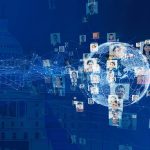Introduction
The world is moving toward an era of “smart nations,” where digital infrastructure, political strategy, and public influence converge. Countries are now racing to build societies powered by artificial intelligence, data governance, and innovation-driven economies.
This transformation is not only technological but also cultural and political. As leaders, tech icons, and celebrities promote futuristic visions, the competition for digital dominance is defining the next chapter of global power.
The Global Race for Technological Supremacy
Nations like the United States, China, and India are investing heavily in artificial intelligence, cybersecurity, and quantum computing. This technological rivalry is reminiscent of the Cold War, but instead of nuclear arms, data and algorithms are the weapons of choice.
Governments are now establishing “digital ministries” and funding AI research to secure strategic advantages. The race for innovation is not just about progress—it’s about national identity, security, and influence in an interconnected world.
The Political Power of Digital Governance
Technology has redefined governance. Smart cities use sensors to monitor traffic, reduce emissions, and enhance public safety, while e-governance systems bring citizens closer to political processes. However, this digital shift also exposes nations to cyber threats and surveillance concerns.
As governments embrace automation, the balance between efficiency and privacy becomes a defining political challenge. Digital governance has the potential to empower citizens, but only if transparency and ethics are placed at its core.
Celebrities as Tech Ambassadors and Advocates
Celebrities are no longer just entertainers—they are becoming ambassadors of technology and sustainability. Elon Musk, with ventures like Tesla and SpaceX, embodies the fusion of fame, innovation, and influence, inspiring millions to embrace futuristic thinking.
Other celebrities, such as Emma Watson and Leonardo DiCaprio, use their global platforms to advocate for renewable energy and environmental technology. Their visibility gives critical issues global attention, merging celebrity culture with responsible innovation.
Artificial Intelligence and the Shifting Labor Landscape
AI automation is transforming industries, eliminating certain jobs while creating new ones in robotics, data analysis, and digital marketing. This shift is forcing governments and businesses to rethink education and workforce policies to adapt to the changing world.
While automation promises higher productivity, it also raises concerns about inequality. Policymakers face growing pressure to ensure that technology serves humanity rather than replaces it, making inclusive development a central priority.
Tech Giants as New Global Powers
Major technology corporations are now as influential as entire nations. Companies like Google, Microsoft, and Amazon shape economic policies, influence elections, and redefine the global labor market. Their reach extends beyond borders, making them global actors in both commerce and politics.
This concentration of power has sparked debates about accountability and regulation. As these digital empires grow, governments are struggling to keep up, highlighting the urgent need for global cooperation in tech governance.
The Intersection of Politics and Innovation
Political leaders are increasingly embracing innovation as part of their national agendas. Policies on AI ethics, 5G infrastructure, and data sovereignty have become tools for asserting independence and competitiveness on the global stage.
The result is a new form of diplomacy—“tech diplomacy”—where nations collaborate on cybersecurity, data sharing, and digital rights. The ability to build alliances through technology is becoming as vital as traditional military or economic strength.
Cultural Shifts in the Age of Digital Fame
Social media has blurred the line between politics, entertainment, and personal branding. World leaders now use platforms like X (formerly Twitter) and Instagram to communicate directly with citizens, bypassing traditional media.
This digital intimacy has reshaped public engagement, creating a mix of authenticity and performance. The culture of influence now defines not only celebrity behavior but also how governments connect with their people.
FAQs
What is a smart nation?
A smart nation uses technology, AI, and data-driven policies to improve governance, economy, and quality of life.
How are tech giants influencing politics?
Tech corporations impact elections, control information flow, and shape digital laws across multiple countries.
Are celebrities playing a role in tech advancement?
Yes, many celebrities promote innovation, sustainability, and AI awareness through global advocacy and partnerships.
What are the risks of AI in governance?
AI can improve efficiency but may also lead to privacy violations, job loss, and algorithmic bias if left unregulated.
Why is global tech competition important?
Technological dominance determines economic growth, security, and international influence in the 21st century.
Conclusion
The fusion of technology, politics, and celebrity culture is redefining global power dynamics. As nations compete to lead in AI and innovation, influence is increasingly measured by connectivity and creativity rather than military might.
The rise of smart nations signals a new world order—one where digital infrastructure, ethical leadership, and public influence determine a country’s strength. The challenge ahead lies in using technology not just to lead, but to uplift humanity as a whole.



